As a dog owner, one of your most crucial responsibilities is ensuring your furry friend’s safety and health.
While sharing your snacks with your dog may be tempting, it’s vital to know that many common human foods can be dangerous, even lethal, to dogs. Every year, thousands of pets suffer from poisoning due to the ingestion of toxic foods, making awareness and prevention essential for every pet parent.
Why Certain Foods Are Dangerous to Dogs
Dogs have different metabolic and digestive systems than humans. What is harmless to us can be toxic to them. Foods that are perfectly safe for human consumption can cause a range of health issues in dogs, from mild gastrointestinal upset to severe poisoning and even death.
20 Foods Harmful to Dogs
Chocolate

Chocolate is widely known as a hazardous substance for dogs, primarily due to its content of theobromine and caffeine. These compounds, while tolerable in humans, can lead to severe health issues in dogs.
The consumption of chocolate by dogs can result in symptoms ranging from mild to severe, including vomiting and diarrhea, which are among the earliest signs of chocolate poisoning.
In more serious cases, ingestion can lead to significant heart problems, such as abnormal heart rhythms, high blood pressure, and high heart rates, and neurological issues like seizures. Chocolate can also lead to pancreatitis due to its high-fat content.
The level of toxicity depends on the type and amount of chocolate consumed and the size of the dog. Darker chocolates, which contain higher levels of theobromine and caffeine, are particularly dangerous.
Even small amounts can be harmful, so it’s crucial to keep all forms of chocolate, including cocoa powder and dark chocolate, well out of reach of pets. Dr. Shelby Neely tells us, “Chocolate is the most common food toxicity problem we see in the hospital.”
Nuts
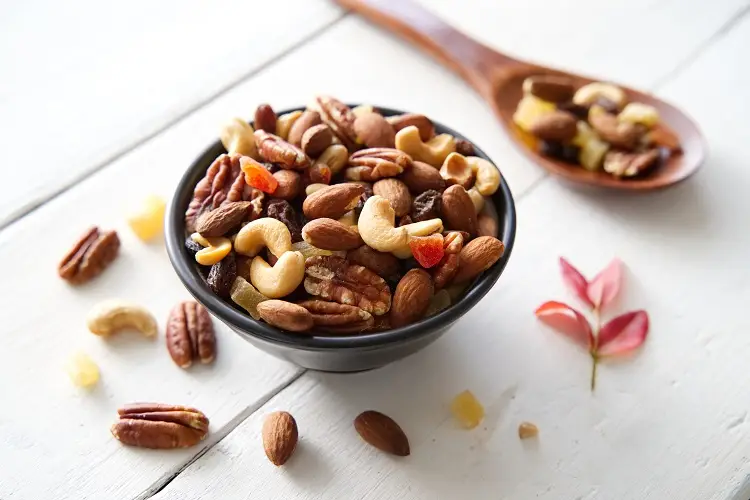
Nuts, particularly Macadamia, Almonds, Black Walnuts, Old and Moldy Walnuts, Raw Cashews, Hickory Nuts, Pecans, and Pistachios pose significant health risks to dogs.
Macadamia nuts are especially hazardous; even a small quantity can cause symptoms such as vomiting, lethargy, and hyperthermia (elevated body temperature). These nuts may also induce neurological symptoms, including tremors and weakness in the hind legs, potentially leading to temporary paralysis.
Almonds, while not as toxic as Macadamia nuts, can cause digestive upset and are challenging for dogs to digest. Pistachios, too, are not recommended for dogs. They can lead to gastrointestinal distress and, due to their high-fat content, potentially contribute to pancreatitis.
Additionally, nuts are often salted or flavored, which can further complicate their effects on a dog’s health. Overall, due to these risks, it is advisable to keep all forms of nuts away from dogs to ensure their safety and well-being.
Alcohol

Even small amounts of alcohol can cause ethanol poisoning in dogs, leading to vomiting, breathing difficulties, and neurological issues such as disorientation and lethargy.
Severe cases can result in seizures, a drop in body temperature and blood pressure, and potentially death. Immediate veterinary attention is crucial for dogs that ingest alcohol. This includes beer and even household products that include alcohol, such as rubbing alcohol.
Salt
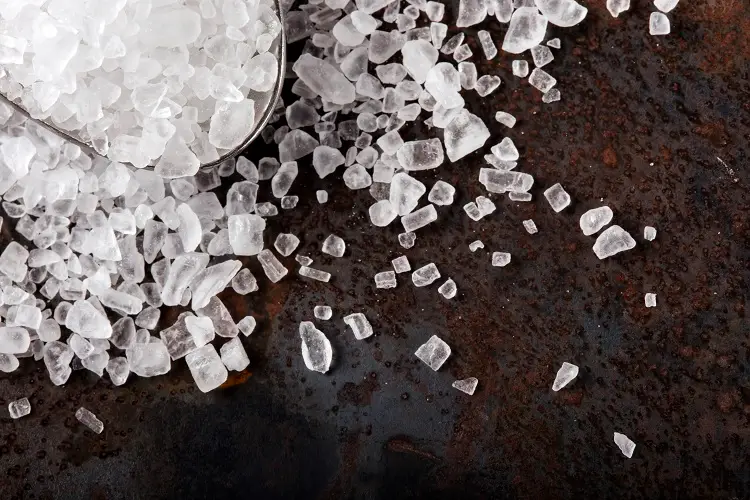
High salt intake can cause salt poisoning in dogs, leading to symptoms like vomiting, diarrhea, and neurological issues like tremors and seizures.
Salt poisoning can result in severe dehydration, kidney damage, and even death, so it’s important to monitor your dog’s salt intake and ensure they have access to fresh water. Dr. Neely advises, “Do not share your salty pretzels or chips with your dog.”
Xylitol

Found in many sugar-free products, xylitol causes a rapid insulin release in dogs, leading to hypoglycemia. Symptoms include vomiting, loss of coordination, lethargy, and seizures. Severe cases can lead to liver failure, requiring immediate veterinary care.
Dr. Neely cautions, “Xylitol is a sneaky one. It is often found in sugar-free products which you won’t know about unless you check labels carefully.”
Coffee and Tea

Containing caffeine, coffee and tea can be toxic to dogs, causing restlessness, rapid breathing, heart palpitations, and muscle tremors. Severe cases can lead to seizures or death. Keep all caffeine-containing products out of your dog’s reach and seek veterinary care if ingested.
Grapes and Raisins
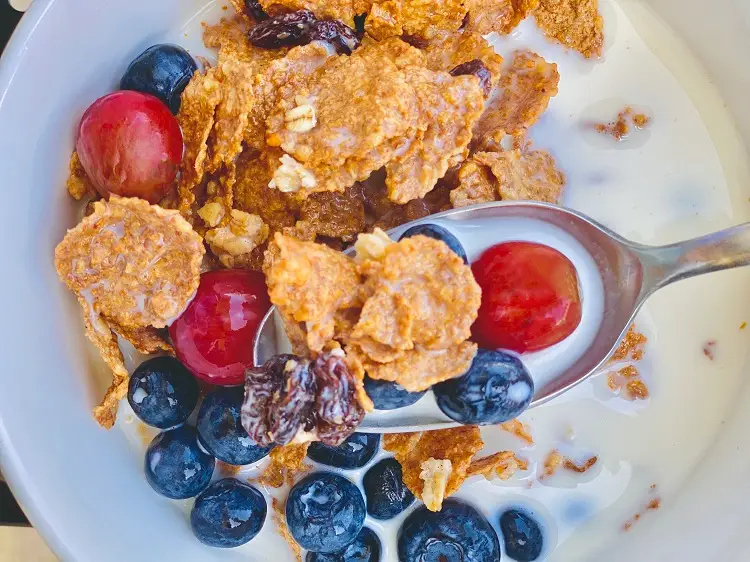
These fruits can cause sudden kidney failure in dogs, with symptoms like vomiting, lethargy, and depression. There’s no safe amount known, and the effects can be fatal. Avoid giving grapes and raisins to dogs and seek immediate veterinary care if ingested.
Fruit Seeds
Seeds from apples, cherries, plums, peaches, and similar fruits contain cyanide, which is poisonous to dogs. Symptoms include difficulty breathing and dilated pupils. Ensure dogs do not ingest these seeds and seek veterinary care immediately if they do.
Yeast Dough
Yeast dough poses a unique danger to dogs. When ingested, the dough expands inside the stomach, potentially causing severe pain and bloating.
This expansion process also leads to ethanol production, a form of alcohol, which can result in ethanol poisoning. Symptoms include disorientation, vomiting, and lethargy, necessitating immediate veterinary care.
Tobacco
Tobacco, containing nicotine, is highly toxic to dogs. When ingested, it can lead to serious health issues such as vomiting, an abnormal heart rate, and tremors. In severe cases, nicotine poisoning can result in life-threatening conditions, including cardiac arrest and respiratory failure, which may lead to death without prompt treatment.
Onions and Garlic
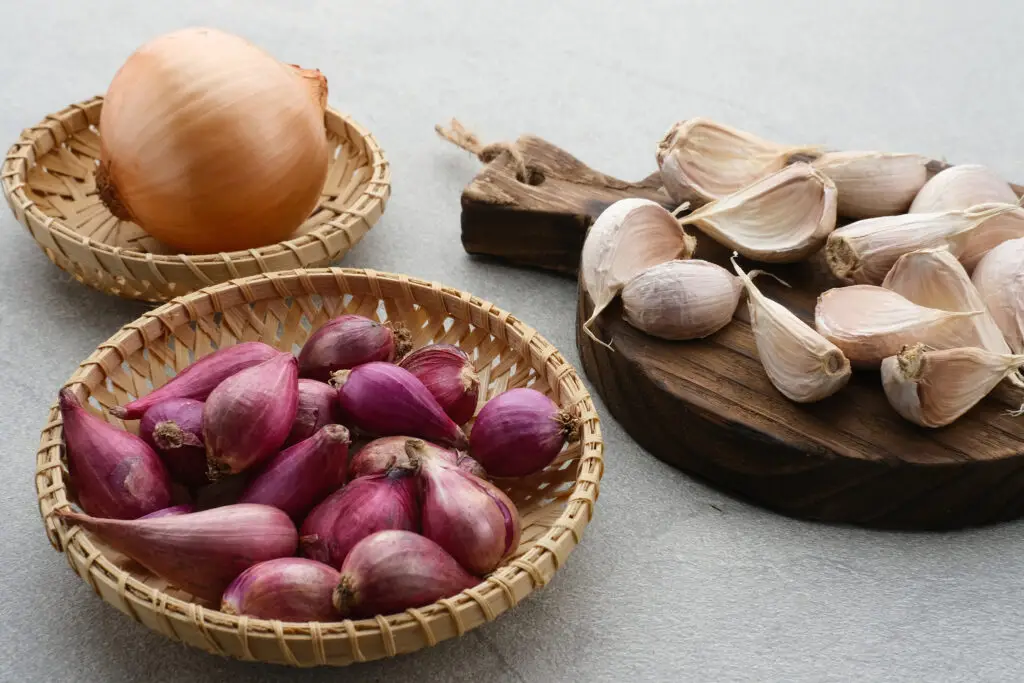
Onions and garlic, common ingredients in human cuisine, are highly toxic to dogs. They contain compounds that can cause oxidative damage to red blood cells.
This damage impairs the red blood cells’ ability to transport oxygen effectively, potentially leading to hemolytic anemia, a condition where red blood cells are destroyed faster than they can be produced.
Symptoms of this toxicity in dogs can include vomiting, diarrhea, lethargy, weakness, pale gums, rapid breathing, and, in severe cases, jaundice or urine that is darkly colored. These signs might not appear immediately and can be delayed for several days, making vigilance and prompt veterinary attention crucial if ingestion is suspected.
Dr. Neely reminds us that “it’s important for pet owners to be aware that even small amounts of onions and garlic, including powdered forms, can be dangerous and should be kept well out of reach of dogs”.
Milk and Dairy Products

Milk and dairy products, often perceived as harmless treats, can actually pose digestive challenges for many dogs. This is primarily due to lactose intolerance, a condition where dogs lack the enzyme lactase needed to properly digest lactose, a sugar found in milk.
When lactose-intolerant dogs consume dairy products, they often experience gastrointestinal upset, which can manifest as symptoms like diarrhea, gas, and abdominal discomfort. While some dogs may tolerate small amounts of dairy without issue, others may have more severe reactions.
It’s essential for pet owners to observe their dog’s response to dairy products carefully and generally opt for lactose-free alternatives or avoid dairy altogether to prevent discomfort and maintain their pet’s digestive health.
This mindful approach helps ensure that treats given to dogs are both enjoyable and safe for their unique dietary needs.
Broccoli (In Large Amounts)
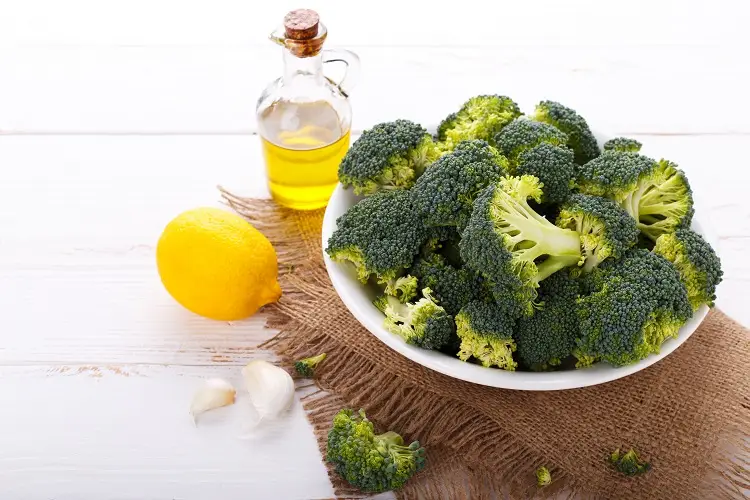
In large quantities, broccoli can be harmful to dogs due to its content of isothiocyanates. These compounds can lead to gastric irritation in canines, manifesting as symptoms like stomach pain, gas, and diarrhea. While small amounts may be safe, it’s crucial to moderate broccoli intake to avoid digestive upset.
Caffeinated Beverages

Caffeinated beverages, akin to chocolate, contain stimulants that are dangerous for dogs. The caffeine in these drinks can lead to restlessness, a noticeable increase in heart rate, and heart palpitations in canines.
These symptoms are due to caffeine’s effect on the nervous and cardiovascular systems. In larger doses, caffeine can cause more severe issues, including tremors, seizures, and potentially life-threatening conditions. Therefore, keeping all caffeinated beverages out of a dog’s reach is essential.
Fatty Meats (Like Bacon)

Fatty meats, such as bacon, pose a significant health risk to dogs. Their high-fat content can trigger pancreatitis, an inflammation of the pancreas that disrupts its normal functions. Symptoms of pancreatitis in dogs include vomiting, abdominal pain, and lethargy.
This condition can range from mild discomfort to a severe, life-threatening illness. It’s important to avoid feeding dogs fatty meats and to opt for leaner protein sources to maintain their health and well-being.
Mushrooms (Certain Types)

Certain types of mushrooms, such as amanita, galerina, false morels, inocybe, and more, are highly toxic to dogs and can cause severe gastrointestinal distress, characterized by symptoms like vomiting, diarrhea, and abdominal pain.
The toxicity varies depending on the mushroom species, with some having compounds that can also lead to liver and kidney damage. Neurological symptoms may also occur. These more severe cases may result in long-term health complications or even be fatal.
It’s crucial for dog owners to prevent their pets from ingesting wild mushrooms and to seek immediate veterinary care if ingestion occurs.
Spicy Foods

Spicy foods, particularly those containing ingredients like chili peppers, cayenne, paprika, and jalapeños, can cause significant stomach upset and irritation, even ulcers, in dogs.
These ingredients contain capsaicin, which gives them their heat and can lead to symptoms like vomiting, diarrhea, and excessive thirst. Foods seasoned with hot spices, such as certain salsas, jerk seasoning, or spicy curries, can also upset a dog’s digestive system.
To prevent discomfort and potential health issues, it’s best to avoid feeding dogs any food that contains these spicy elements.
Raw Potatoes
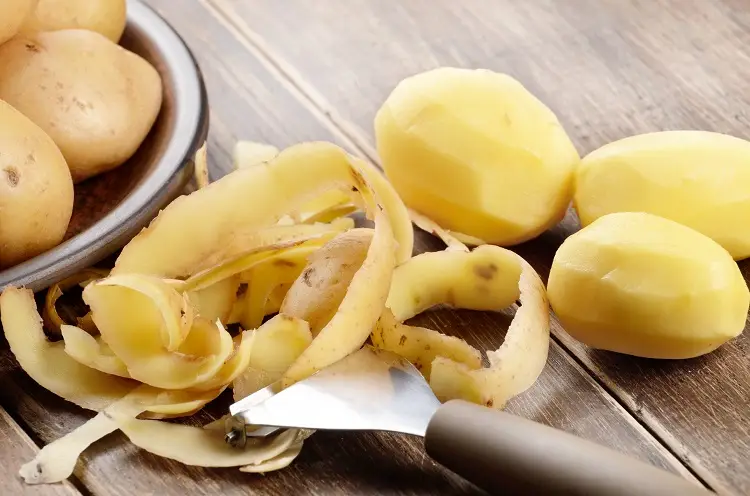
Raw potatoes contain solanine, a compound that is toxic to dogs. When ingested, solanine can cause gastrointestinal distress, including vomiting and diarrhea, and in more severe cases, it can lead to neurological issues like tremors and seizures. Cooking potatoes reduces their solanine content, making them safer for canine consumption.
Rhubarb Leaves

Rhubarb leaves contain oxalates, which are extremely toxic to dogs. Ingestion of these leaves can lead to acute kidney failure. Symptoms of rhubarb toxicity include drooling, vomiting, diarrhea, lethargy, and, in severe cases, tremors and kidney failure. While rhubarb stalks contain lower levels of oxalates and are less harmful, it’s safest to avoid feeding any part of the rhubarb plant to dogs to prevent the risk of toxicity.
Safe Alternatives
- Cooked Lean Meats (without bones or heavy seasoning): Chicken, turkey, and lean beef are great protein sources.
- Apples (Minus the Seeds): High in fiber and vitamins, but ensure to remove the core and seeds.
- Bananas: A good source of potassium and fiber, but offer in moderation due to high sugar content.
- Blueberries: Rich in antioxidants and vitamins, perfect as a small treat.
- Carrots: Good for dogs’ teeth and high in fiber and vitamins.
- Green Beans: Non-toxic and low in calories, a healthy snack.
- Sweet Potatoes: Cooked sweet potatoes are nutritious and rich in fiber.
- Plain Rice: A good option for dogs with upset stomachs; it is easy to digest.
- Oatmeal: Provides fiber and is particularly good for senior dogs with bowel irregularity issues.
- Low-Fat Yogurt: Contains probiotics and is a good calcium source, but ensure it’s free from artificial sweeteners.
- Pumpkin: Excellent for digestion and helps with both diarrhea and constipation.
- Pears: Without seeds or core, pears are safe and provide vitamins and fiber.
- Peas: Frozen or fresh (not canned), peas are a good source of protein and vitamins.
- Cucumbers: Great low-calorie snack, especially for overweight dogs.
- Zucchini: Safe and healthy; high in vitamins and minerals.
- Cooked Eggs: A great source of protein, but ensure they are fully cooked without seasonings.
- Fish (Cooked, Boneless): Particularly salmon and sardines for omega-3 fatty acids, but ensure it’s thoroughly cooked and boneless.
What To Do In Case of Accidental Ingestion
If your dog ingests any harmful food, immediate action is crucial. Contact your veterinarian or an animal poison control center. Be prepared to provide information about what and how much your dog consumed. In some cases, inducing vomiting or other first aid measures may be necessary, but only under professional guidance.
Prevention Tips
To prevent accidental ingestion:
- Keep harmful foods out of your dog’s reach.
- Educate all family members about the dangers of certain foods.
- Be mindful of what you’re feeding your pet, even when it comes to treats and table scraps.
Understanding and respecting the dietary needs and restrictions of our canine companions is essential. By being aware of the foods harmful to dogs and focusing on safe dietary choices, we can ensure the well-being of our beloved pets.
This article has been reviewed and fact-checked by Dr. Shelby Neely. Dr. Neely is a licensed veterinarian with a long history of active practice and writing. She enjoys spending time with her three children, her pets, theater, and music.






